JEDDAH: With the harvest season kicking off, the Royal Commission for AlUla’s second citrus festival is showcasing a variety of local produce and attracting domestic and international visitors.
AlUla produces an estimated 15,000 tons annually, which represents 30 percent of the Kingdom’s total production. The governorate has 4,700 farms with more than 200,000 trees spread over 800 hectares.
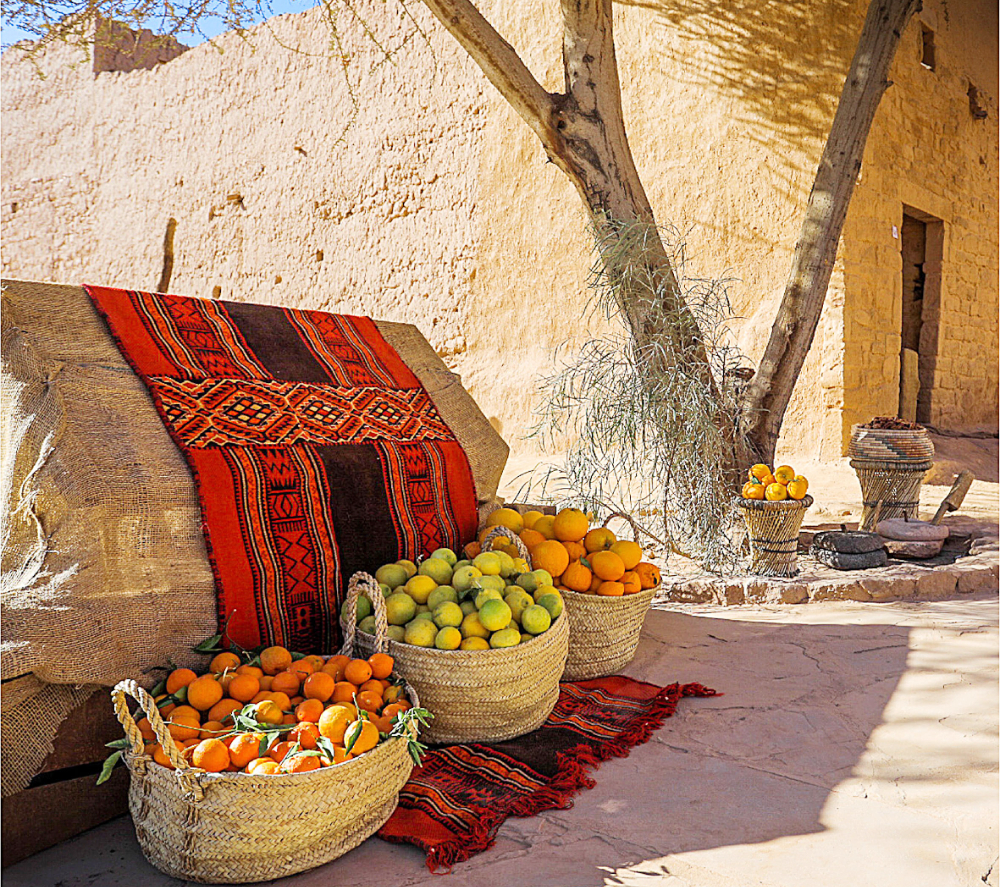
AlUla’s citrus fruits are used for cooking and medicinal purposes. (Supplied)
The AlUla Citrus Festival, which kicked off on Friday and runs until Jan. 21, features fresh local agricultural produce that has provided significant economic benefits for the region.
The festival also provides a marketing window for citrus-based goods including jams, juices, baked products, sweets, perfumes, detergents and cosmetics. The fruits are also used for their valuable medicinal properties, essential oils and aromatic scents.
(The festival) will lead to the spread, growth, and (an) increase in returns for the farmers.
Badr Al-Mutairi, Saudi agricultural consultant
Badr Al-Mutairi, a Saudi agricultural consultant, told Arab News that with tourists attracted to the ancient landmarks in AlUla, there is also an opportunity for the region to showcase its citrus products globally.
“Once visitors try and taste these fruits, I am sure they will recommend them (because of their quality), which will lead to the spread, growth, and (an) increase in returns for the farmers. This will accordingly lead to an increase in the agricultural area of this crop.”
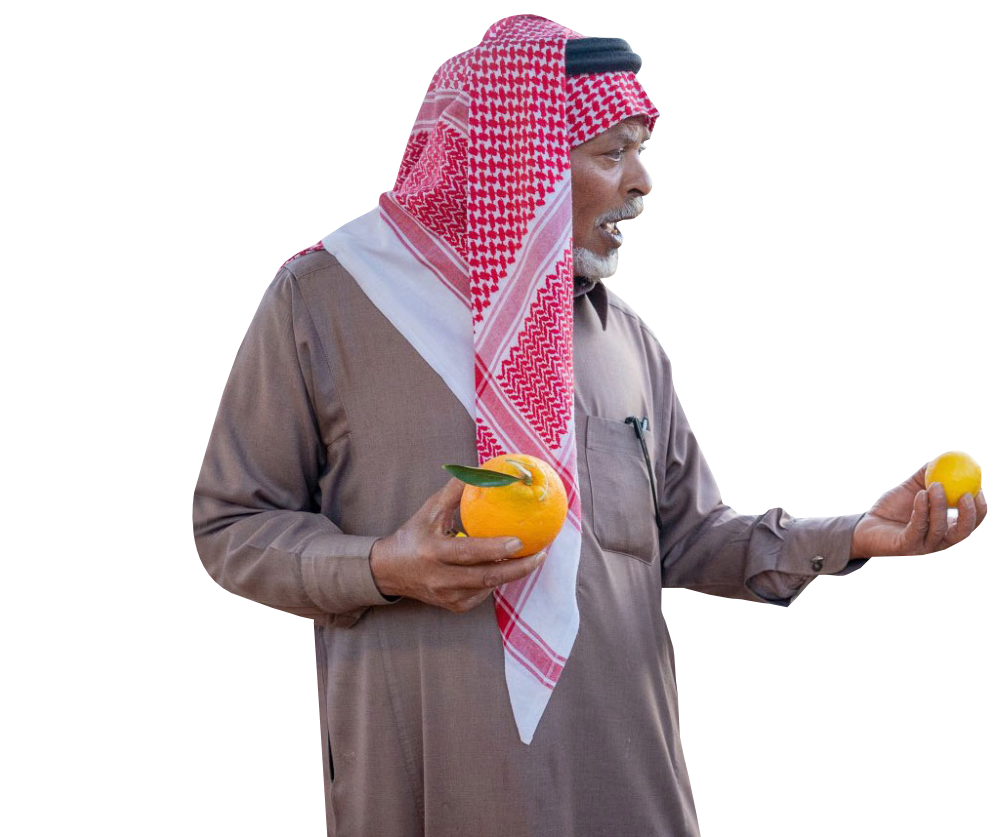
With 29 types of citrus fruits are displayed in the festival among the diverse group of citrus fruits that thrive in the fertile soil of the oases. Oranges are the most common, representing a percentage of 70 to 80 percent of the citrus produced in AlUla. (Twitter @RCU_SA)
Al-Mutairi opposes the selling of low-quality products that could have a negative impact on the experiences of visitors.
Diversity and dishes
Twenty-nine types of citrus fruit, grown from AlUla’s fertile soil, are displayed at the festival, with oranges accounting for between 70 to 80 percent of the produce.
Many local varieties are also grown including Jaffa oranges, sometimes known by their Arabic name, “Shamouti.” They are sweet, with few seeds and tough skin.
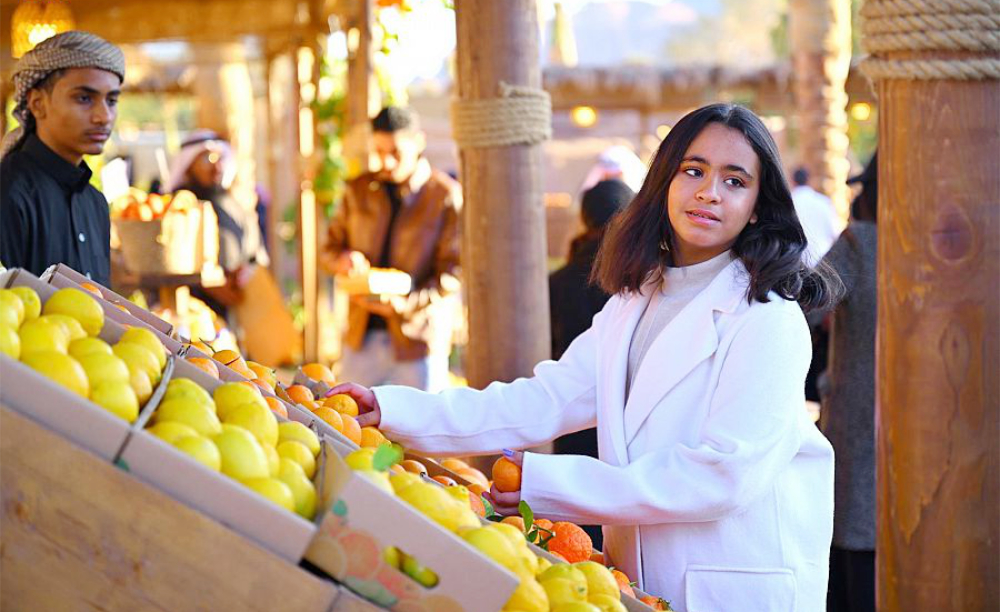
AlUla Citrus Festival represents its agrarian variety. (SPA)
The sweet or “Sukkari” orange is yellowish and known for being juicy, while the navel orange offers a richer and more acidic flavor.
“Baladi” oranges have a darker tone of orange and are considered perfect for making juices.
HIGHLIGHTS
• Local farmers will display the season’s freshest and juiciest produce at the AlUla Citrus Festival until Jan. 21. AlUla’s rich, fertile soil grows 29 types of citrus fruit.
• Oranges are the pride of AlUla, accounting for about 70-80% of the produce. Among these are the following varieties of oranges: Jaffa, Sukkari, Baladi (great for juicing), mandarins, clementines, and more.
• The Royal Commission for AlUla conducted a feasibility study for the establishment of a farmers’ services center. The center aims to enhance the skills of farmers and associated industry professionals with training courses and workshops. A training course was held over the weekend with 40 farmers and operators in the field.
Mandarins, clementines and tangerines are popular among the locals of AlUla.
Different types of lemons are also on display including “Bin Zuhair,” which is a well-known type of sweet lime, and “Adalia” lemons.
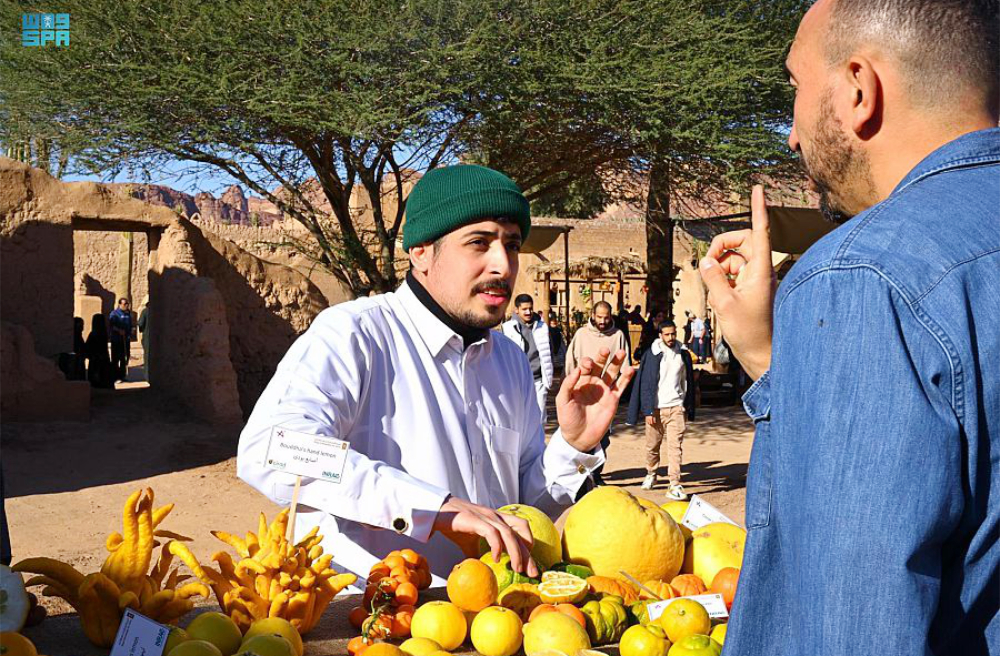
AlUla Citrus Festival represents its agrarian variety. (SPA)
As for grapefruit, the dark red star ruby variety is popular with AlUla residents, and the seedless marsh variety also grows in the area. Pomelo and kumquat, known locally as “Royal,” can also be found at the festival.
The festival’s participants add further value to their produce by offering local and international recipes and dishes with citrus fruit.
NUMBER
15k
tons of citrus fruits are produced in AlUla every year.
There are several live cooking shows with well-known chefs, which included France’s Michelin-starred William Ledeuil preparing special meals over the first weekend of the festival.
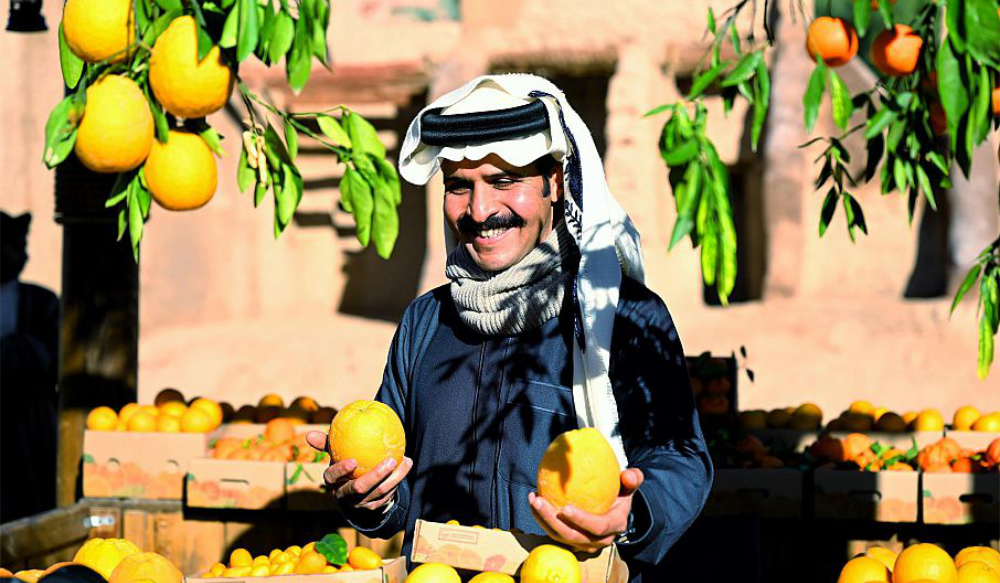
AlUla Citrus Festival represents its agrarian variety. (SPA)
The upcoming weekend will feature Japanese chef Keiko Nagae, who has worked in some of Europe’s and Japan's best restaurants, and others including Pierre Gagnaire, Yannick Alleno and Michel Troisgros.
Citrus cultivation
AlUla has been an agricultural bastion for thousands of years. Citron, for example, is considered one of the ancient varieties cultivated in the area. It features a thick yellow-green peel, with a fragrant aroma, but is bitter with little to no juice and pulp. It was used in the past for cooking, jam, perfumes, and medicinal products.
Agriculturally speaking, citron is a hybrid mixture of lemon and pomelo, its trees are still famous in the region today, and farmers take pride in showing them to visitors.
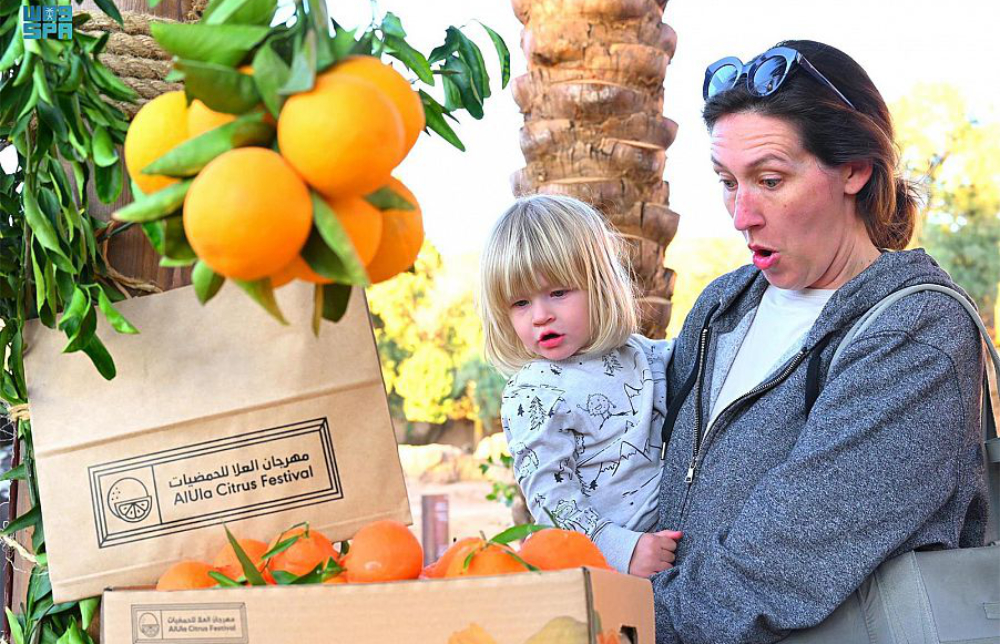
The festival aims to shed light domestically and internationally on AlUla's distinguished citrus products to support and market AlUla’s citrus fruits. (Twitter @RCU_SA)
Al-Mutairi is an inspector certified with the Saudi Organic and Regulation Standards organization, the US’ National Organic Program, and the European and Japanese agricultural standards bodies.
He said several factors need to be taken into consideration in farming the fruit, which includes the “ideal land (in) well-drained soil rich in organic components, with a hydrogen ratio (PH) of 6.5 to 7,” which is found in AlUla.
Al-Mutairi said that fertilization, protection and pruning are important to “be able to supply the produce with the nutrients it lacks and to obtain a good product in shape, color, taste and quantity.”
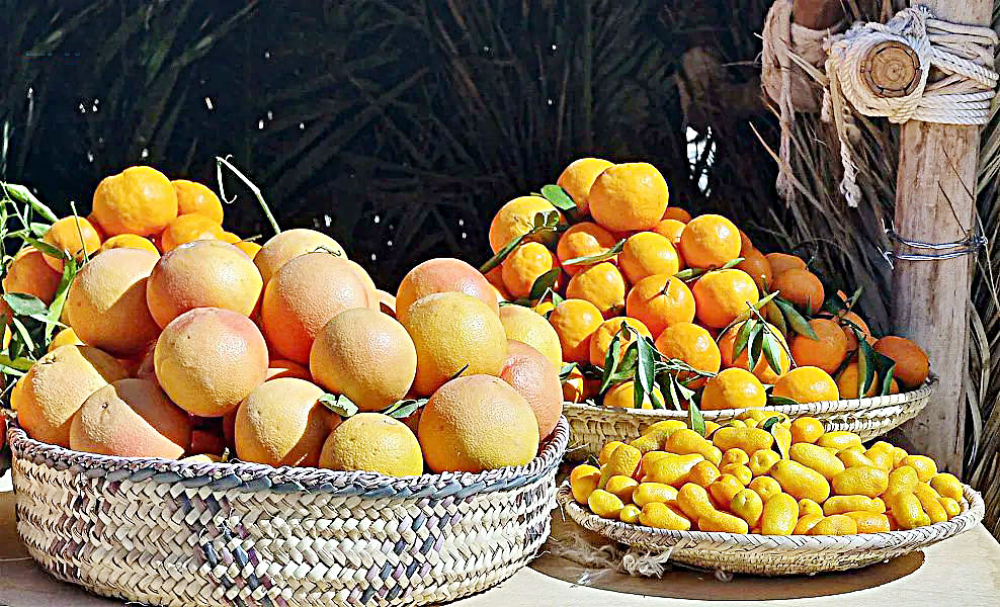
AlUla's citrus crop is estimated at 15,000 tons annually, which represents 30% of the Kingdom's total citrus production. (Twitter @RCU_SA)
There is also a need to control pests and counter diseases that can affect the crop during the growing phase, to ensure quality and quantity, and prevent financial losses for farmers.
Pruning is also essential and has to take place at the right time using the correct methods. “Its importance lies in offering ventilation for trees from the inside and it offers an entry for sunlight as well.” The removal of unnecessary branches allows the fruit-bearing areas to receive the most nutrition, Al-Mutairi said.
The commission has continued to improve cultivation in AlUla, with the recent launch of the High-Quality Citrus Project, which supports research and development. Its ultimate goal is to increase farmers’ profit margins by 50 percent.
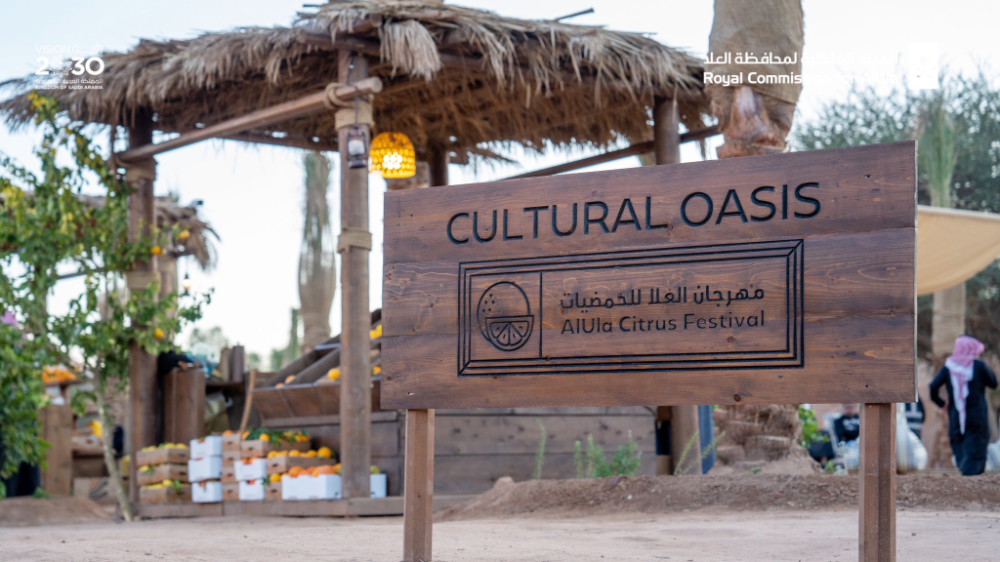
The festival aims to shed light domestically and internationally on AlUla's distinguished citrus products to support and market AlUla’s citrus fruits. (Twitter @RCU_SA)
More than 20 new citrus varieties are currently being introduced and cultivated on a commercial scale to achieve diversity and increase production.
The commission has recently completed a feasibility study that would see the establishment of a farmers’ services center, which aims to improve the quality of citrus fruits and provide refrigerated storage units and manufacturing units.
The center aims to enhance the skills of farmers and associated industry professionals with training courses and workshops. A training course was held over the weekend with 40 farmers and operators in the field.
The Royal Commission for AlUla has also launched the Farmers’ Field Schools and Model Fields Project, which is currently establishing three pilot projects, with the plan to increase it to 15 in various parts of the governorate.
In line with the Kingdom’s Vision 2030 plan, AlUla’s citrus and dates festivals are important contributors to the region’s economy.


























